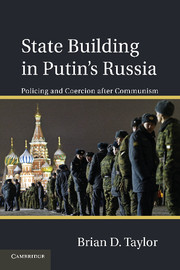Book contents
- Frontmatter
- Contents
- List of Figures, Tables, and Maps
- List of Abbreviations
- Acknowledgments
- Note on Transliteration and Translation
- Introduction
- 1 Bringing the Gun Back In
- 2 The Power Ministries and the Siloviki
- 3 Coercion and Capacity
- 4 Coercion and Capacity
- 5 Coercion and Quality
- 6 Coercion and Quality
- 7 Coercion in the North Caucasus
- 8 State Capacity and Quality Reconsidered
- Appendix A Publication Abbreviations
- Appendix B Interview Index
- References
- Index
Note on Transliteration and Translation
Published online by Cambridge University Press: 04 February 2011
- Frontmatter
- Contents
- List of Figures, Tables, and Maps
- List of Abbreviations
- Acknowledgments
- Note on Transliteration and Translation
- Introduction
- 1 Bringing the Gun Back In
- 2 The Power Ministries and the Siloviki
- 3 Coercion and Capacity
- 4 Coercion and Capacity
- 5 Coercion and Quality
- 6 Coercion and Quality
- 7 Coercion in the North Caucasus
- 8 State Capacity and Quality Reconsidered
- Appendix A Publication Abbreviations
- Appendix B Interview Index
- References
- Index
Summary
I use the transliteration system of the U.S. Board on Geographic Names, which I believe is easier for non-Russian speakers to read than the Library of Congress system (Basayev rather than Basaev, Serdyukov rather than Serdiukov, etc.). I have also used the familiar English form for well-known names (e.g., Ingushetia rather than Ingushetiya, Khodorkovsky rather than Khodorkovskiy). Soft signs are omitted from the main text (e.g., Rossel instead of Rossel'), but preserved in the notes. In cases in which Russian authors have published in English under more than one spelling (e.g., Nikolay/Nikolai Petrov) I have tried to preserve the spelling used for that publication. Other exceptions to this system may occur and are accidental; my apologies.
All translations from Russian are mine unless otherwise noted.
NOTE ON INTERVIEWS AND PRIMARY SOURCES
Much of the material in the book comes from interviews and press accounts. Appendix A provides a list of abbreviations used for Russian- and English-language newspapers and magazines. Appendix B provides a key to the interviews, organized by city and then alphabetically. Anonymity was offered to all respondents and provided when requested. Unless otherwise specified, quotes from speeches by Putin and Medvedev are available at one of the following Web sites: http://archive.kremlin.ru/ (Putin) or http://www.president.kremlin.ru (Medvedev).
- Type
- Chapter
- Information
- State Building in Putin’s RussiaPolicing and Coercion after Communism, pp. xvii - xviiiPublisher: Cambridge University PressPrint publication year: 2011



